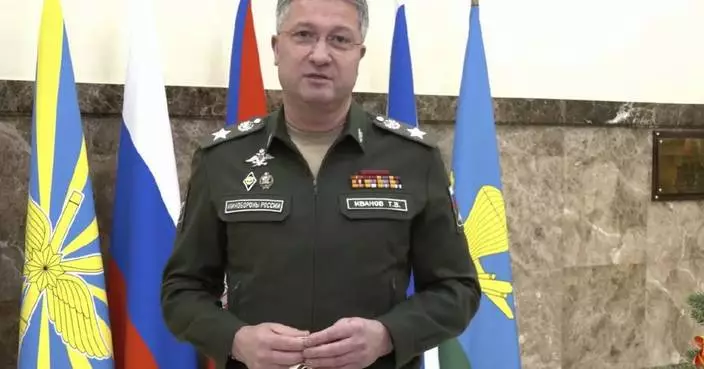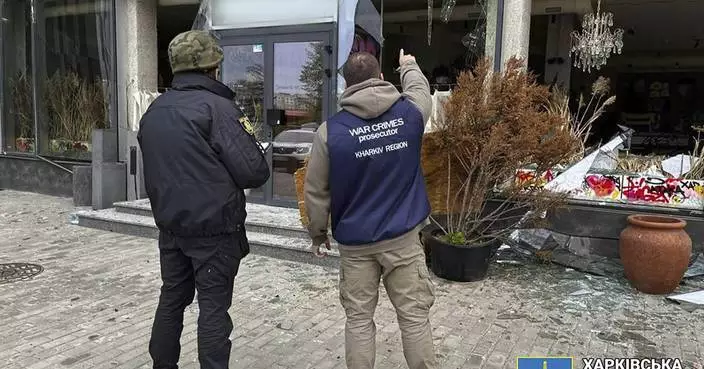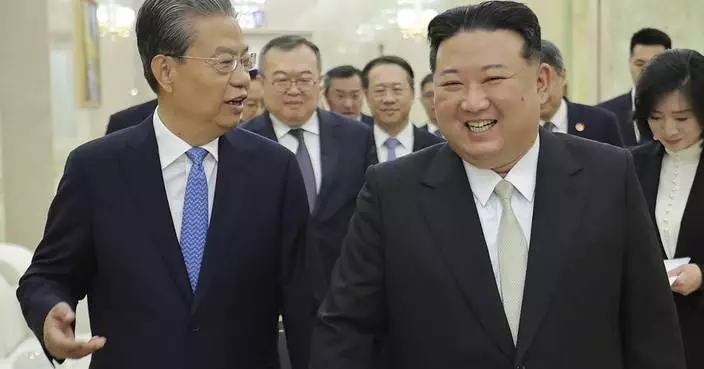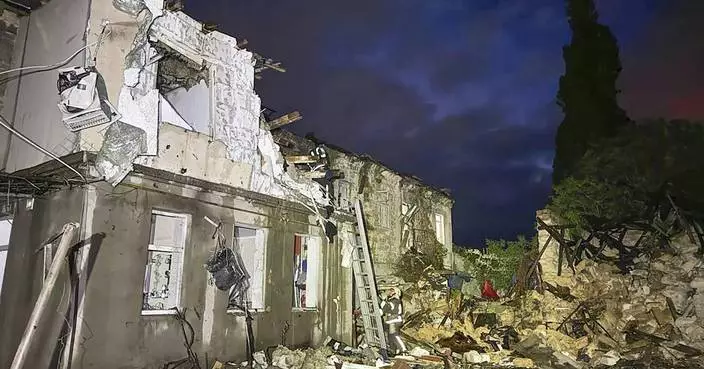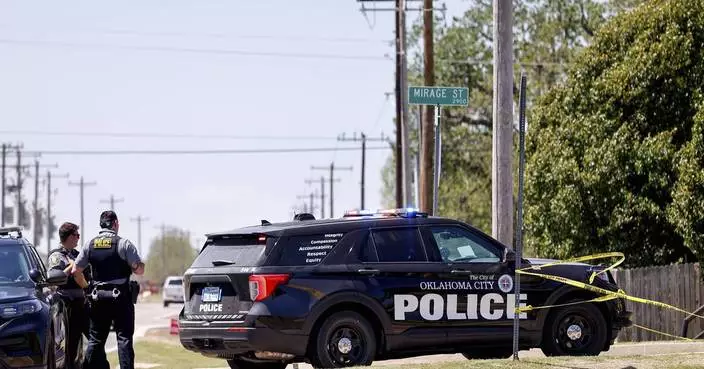Vladimir Putin's victory in Russia's presidential election Sunday isn't in doubt. The only real question is whether voters will turn out in big enough numbers to hand him a convincing mandate for his fourth term — and many Russian workers are facing intense pressure to do so.
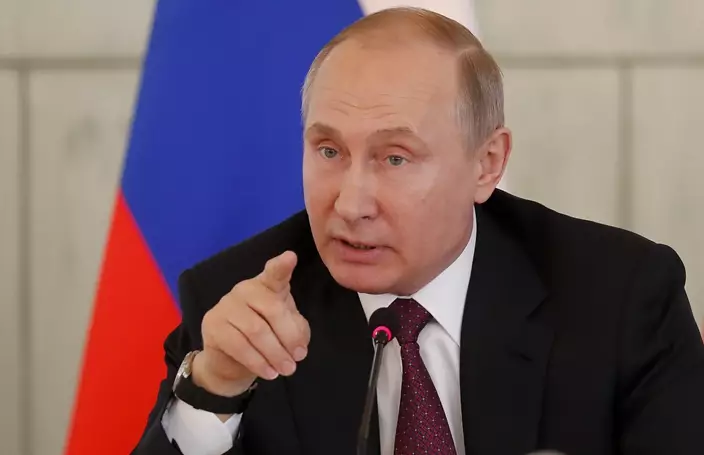
Russian President Vladimir Putin gestures while speaking to employees of the Almazov National Medical Center in St.Petersburg, Russia, Friday, March 16, 2018. (Anatoly Maltsev/Pool Photo via AP)
Polls opened at 8 a.m. Sunday in Russia's Far East regions of Chukotka and Kamchatka. Voting will conclude at 8 p.m. (1800 GMT; 2 p.m. EDT) in Kaliningrad, the Baltic exclave that is Russia's westernmost region.
Click to Gallery
Vladimir Putin's victory in Russia's presidential election Sunday isn't in doubt. The only real question is whether voters will turn out in big enough numbers to hand him a convincing mandate for his fourth term — and many Russian workers are facing intense pressure to do so.
Polls opened at 8 a.m. Sunday in Russia's Far East regions of Chukotka and Kamchatka. Voting will conclude at 8 p.m. (1800 GMT; 2 p.m. EDT) in Kaliningrad, the Baltic exclave that is Russia's westernmost region.
Yevgeny Roizman, the mayor of Russia's fourth-largest city Yekaterinburg, says local officials and state employees have all received orders "from higher up" to make sure the presidential vote turnout is over 60 percent.
The doctor, who gave her name only as Yekaterina because of fears about repercussions, said she and her co-workers were told to fill out forms detailing not only where they would cast their ballots, but giving the names and details of two "allies" whom they promise to persuade to go vote.
Yekaterina said she isn't sure what she'll do with her ballot, musing that "maybe I'll just write 'Putin is a moron.'" But she clearly understands that not showing up at the polling place Sunday will not only endanger her job but will reflect badly on her boss, whom she likes.
Putin urged Russians on Friday to "use their right to choose the future for the great Russia that we all love."
A Russian election monitoring group said Saturday it has registered an "alarming" rise in recent days in complaints that employers are forcing or pressuring workers to vote.
He said his own group has come under increasing pressure as the election approached, and warned that independent observers may be targeted by some kind of "attack" on voting day. He didn't elaborate.
Putin is so certain of winning that authorities are investing instead in massive get-out-the-vote efforts to produce a turnout that would embolden the Russian leader both domestically and internationally.

In this photo taken on Thursday, Feb. 1, 2018, Russian TV host Ksenia Sobchak speaks about her campaign to challenge Vladimir Putin in the March 18 presidential election, during an interview to the Associated Press in Moscow, Russia. (AP Photo/Alexander Zemlianichenko, File)
Yevgeny Roizman, the mayor of Russia's fourth-largest city Yekaterinburg, says local officials and state employees have all received orders "from higher up" to make sure the presidential vote turnout is over 60 percent.
"They are using everything: schools, kindergartens, hospitals — the battle for the turnout is unprecedented," said Roizman, one of the rare opposition politicians to hold a significant elected office.
A doctor at one of the city's hospitals told The Associated Press how one kind of voting pressure works.

A man sets a banner reads "2018 March Election of Russian President" as he prepares a polling station for Sunday's election in Moscow, Russia, Friday, March 16, 2018. (AP Photo/Pavel Golovkin)
The doctor, who gave her name only as Yekaterina because of fears about repercussions, said she and her co-workers were told to fill out forms detailing not only where they would cast their ballots, but giving the names and details of two "allies" whom they promise to persuade to go vote.
"It's not something you can argue about," she said at a cafe Saturday. "People were indignant at first, said 'They're violating our rights' ... but what can you do?"
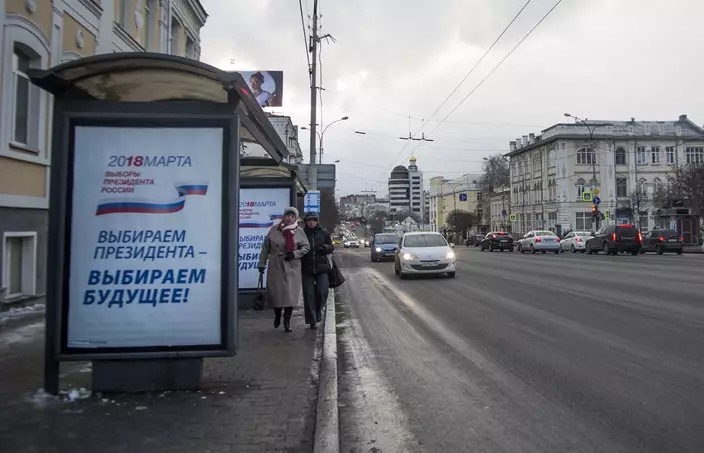
People walk through a street with an election poster that reads: "Choose President - Choose Future!" in Yekaterinburg, Russia, Saturday, March 17, 2018. (AP Photo/Nataliya Vasilyeva)
Yekaterina said she isn't sure what she'll do with her ballot, musing that "maybe I'll just write 'Putin is a moron.'" But she clearly understands that not showing up at the polling place Sunday will not only endanger her job but will reflect badly on her boss, whom she likes.
The Russian doctor said she wouldn't go to vote if she wasn't forced to.
"What's the point? We already know the outcome. This is just a circus show," she said.
The eight presidential candidates were barred from campaigning Saturday, but the message to voters was clear from billboards celebrating Russian greatness — a big theme of Putin's leadership — and Kremlin-friendly media coverage.
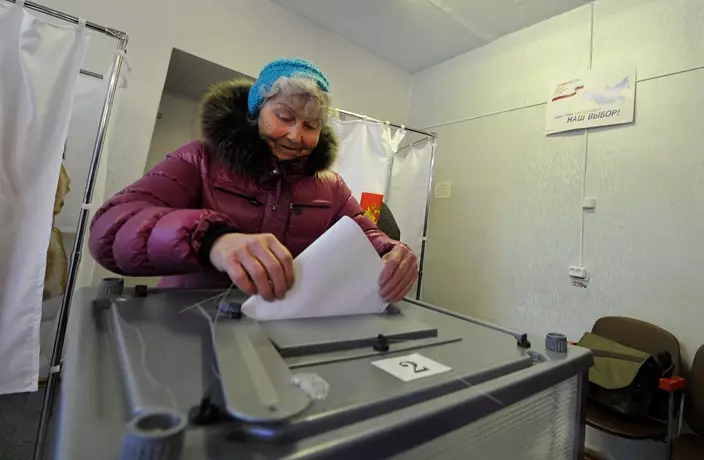
A woman casts her ballot at a polling station in Yelisovo, about 30 kilometers ( 19 miles) north-east from Petropavlovsk-Kamchatsky, capital of Kamchatka Peninsula region, Russian Far East, Russia, on Sunday, March. 18, 2018. Polls have opened in Russia's Far East for the presidential election in which Vladimir Putin seeks a 4th term. (AP Photo/Alexander Petpov)
Putin urged Russians on Friday to "use their right to choose the future for the great Russia that we all love."
While Putin has seven challengers, none is a real threat. The last time he faced voters in 2012, he faced a serious opposition movement, but since then he has boosted his popularity thanks to Russian actions in Ukraine and Syria.
More than 1,500 international observers are joining thousands of Russian observers to watch the vote. The government wants to ensure that this election is clean after ballot stuffing and fraud marred the last Russian presidential election in 2012.
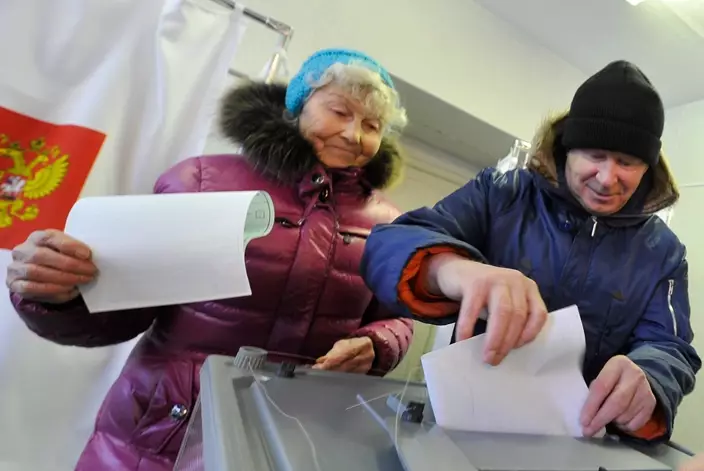
People cast their ballots at a polling station in Yelizovo, about 30 kilometers ( 19 miles) north-east from Petropavlovsk-Kamchatsky, capital of Kamchatka Peninsula region, Russian Far East, Russia, on Sunday, March. 18, 2018. (AP Photo/Alexander Petpov)
A Russian election monitoring group said Saturday it has registered an "alarming" rise in recent days in complaints that employers are forcing or pressuring workers to vote.
Grigory Melkonyants, Co-chair of the independent Golos center, told the AP on Saturday the group has also recorded smaller complaints, such as gimmicks like discounted potatoes for people who vote, or schools holding special performances on Election Day to lure parents to an onsite voting station.

A woman holds a flag that reads "I love Kamchatka, we are the first!" as she prepares to cast her ballots at a polling station in Yelizovo, about 30 kilometers ( 19 miles) north-east from Petropavlovsk-Kamchatsky, capital of Kamchatka Peninsula region, Russian Far East, Russia, on Sunday, March. 18, 2018. (AP Photo/Alexander Petpov)
He said his own group has come under increasing pressure as the election approached, and warned that independent observers may be targeted by some kind of "attack" on voting day. He didn't elaborate.
As U.S. authorities investigate alleged Russian interference in President Donald Trump's 2016 election, Moscow has warned of possible meddling in the Russian vote.
Turnout-boosting efforts have been the most visible feature of the campaign — and all come from taxpayers' pockets. In Moscow alone, authorities are spending 50 million rubles ($870,000) on balloons and festive decorations at polling stations.
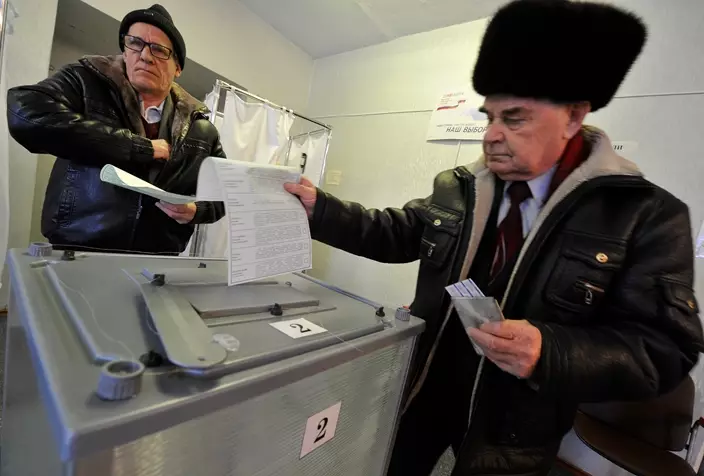
Two men cast their ballots at a polling station in Yelizovo, about 30 kilometers ( 19 miles) north-east from Petropavlovsk-Kamchatsky, capital of Kamchatka Peninsula region, Russian Far East, Russia, on Sunday, March. 18, 2018. (AP Photo/Alexander Petpov)
In Moscow, first-time voters will be given free tickets for pop concerts featuring some of Russia's most popular artists who have campaigned for Putin. For older voters, Moscow health authorities will be offering free cancer screenings at selected polling stations.
In the southern city of Tambov, the state-sponsored Youth Parliament has backed an Instagram competition. Voters who take selfies at polling stations and post them under the designated hashtag will be able to enter a raffle for high-end electronics, including an iPhone X.
Election observers and local media have reported threats and coercion of voters to re-register at their place of work and report later that they have voted.
Ella Pamfilova, Chairwoman of the Central Election Commission who was appointed to clean up Russia's electoral system, vowed to respond to complaints about being coerced to vote.
"No manager has the right to tell them where to vote," she said recently
Voters in Russia's Perm region said they were coming under pressure from their employers to vote Sunday — and to prove it. Messages were sent Friday to regional employees, warning that information about their voting habits would be submitted to management.
Putin has traveled across Russia, pledging to raise wages, pour more funds into the country's crumbling health care and education and to modernize dilapidated infrastructure.
The presidential vote is set on the anniversary of Russia's 2014 annexation of Crimea from Ukraine. Polls show that most Russians continue to see the takeover of that Black Sea peninsula as a major achievement despite subsequent Western sanctions.
Among Putin's challengers is Ksenia Sobchak, a 36-year-old TV host who has campaigned on a liberal platform and criticized Putin's policies. Some see Sobchak, the daughter of Putin's one-time patron, as a Kremlin project intended to add a democratic veneer to the vote and help split the ranks of Kremlin critics.
Putin's main foe, opposition leader Alexei Navalny, was barred from the race because of a criminal conviction widely seen as politically motivated. Navalny has called for a boycott of the vote.
WASHINGTON (AP) — Ukraine for the first time has begun using long-range ballistic missiles provided secretly by the United States, bombing a Russian military airfield in Crimea last week and Russian forces in another occupied area overnight, American officials said Wednesday.
Long sought by Ukrainian leaders, the new missiles give Ukraine nearly double the striking distance — up to 300 kilometers (190 miles) — that it had with the mid-range version of the weapon that it received from the U.S. last October. One of the officials said the U.S. is providing more of these missiles in a new military aid package signed by President Joe Biden on Wednesday.
Biden approved delivery of the long-range Army Tactical Missile System, known as ATACMS, in early March, and the U.S. included a “significant” number of them in a $300 million aid package announced at the time, one official said.
The two U.S. officials, who spoke on condition of anonymity to discuss the delivery before it became public, would not provide the exact number of missiles given last month or in the latest aid package, which totals about $1 billion.
Ukraine has been forced to ration its weapons and is facing increasing Russian attacks. Ukraine had been begging for the long-range system because the missiles provide a critical ability to strike Russian targets that are farther away, allowing Ukrainian forces to stay safely out of range.
Information about the delivery was kept so quiet that lawmakers and others in recent days have been demanding that the U.S. send the weapons — not knowing they were already in Ukraine.
For months, the U.S. resisted sending Ukraine the long-range missiles out of concern that Kyiv could use them to hit deep into Russian territory, enraging Moscow and escalating the conflict. That was a key reason the administration sent the mid-range version, with a range of about 160 kilometers (roughly 100 miles), in October instead.
A senior U.S. military official said Wednesday that the White House and military planners looked carefully at the risks of providing long-range fires to Ukraine and determined that the time was right to provide them now.
Adm. Christopher Grady, vice chairman of the Joint Chiefs of Staff, told The Associated Press in an interview that long-range weapons will help Ukraine take out Russian logistics nodes and troop concentrations that are not on the front lines. He declined to identify what specific weapons were being provided but said they will be “very disruptive if used properly, and I’m confident they will be.”
Like many of the other sophisticated weapons systems provided to Ukraine, the administration weighed whether their use would risk further escalating the conflict.
“I think the time is right, and the boss (Biden) made the decision the time is right to provide these based on where the fight is right now,” Grady said Wednesday. “I think it was a very well considered decision, and we really wrung it out — but again, any time you introduce a new system, any change — into a battlefield, you have to think through the escalatory nature of it.”
Ukrainian officials haven’t publicly acknowledged the receipt or use of long-range ATACMS. But in thanking Congress for passing the new aid bill Tuesday, Ukrainian President Volodymyr Zelenskyy noted on the social platform X that “Ukraine’s long-range capabilities, artillery and air defense are extremely important tools for the quick restoration of a just peace.”
One of the U.S. officials said the Biden administration warned Russia last year that if Moscow acquired and used long-range ballistic missiles in Ukraine, Washington would provide the same capability to Kyiv.
Russia got some of those weapons from North Korea and has used them on the battlefield in Ukraine, said the official, prompting the Biden administration to greenlight the new long-range missiles.
The U.S. had refused to confirm that the long-range missiles were given to Ukraine until they were actually used on the battlefield and Kyiv leaders approved the public release. One official said the weapons were used early last week to strike the airfield in Dzhankoi, a city in Crimea, a peninsula that Russia seized from Ukraine in 2014. They were used again overnight east of the occupied city of Berdyansk.
Videos on social media last week showed the explosions at the military airfield, but officials at the time would not confirm it was the ATACMS.
Ukraine’s first use of the weapon came as political gridlock in Congress had delayed approval of a $95 billion foreign aid package for months, including funding for Ukraine, Israel and other allies. Facing acute shortages of artillery and air defense systems, Ukraine has been rationing its munitions as U.S. funding was delayed.
With the war now in its third year, Russia used the delay in U.S. weapons deliveries and its own edge in firepower and personnel to step up attacks across eastern Ukraine. It has increasingly used satellite-guided gliding bombs — dropped from planes from a safe distance — to pummel Ukrainian forces beset by a shortage of troops and ammunition.
The mid-range missiles provided last year, and some of the long-range ones sent more recently, carry cluster munitions that open in the air when fired, releasing hundreds of bomblets rather than a single warhead. Others sent recently have a single warhead.
One critical factor in the March decision to send the weapons was the U.S. Army’s ability to begin replacing the older ATACMS. The Army is now buying the Precision Strike Missile, so is more comfortable taking ATACMS off the shelves to provide to Ukraine, the official said.
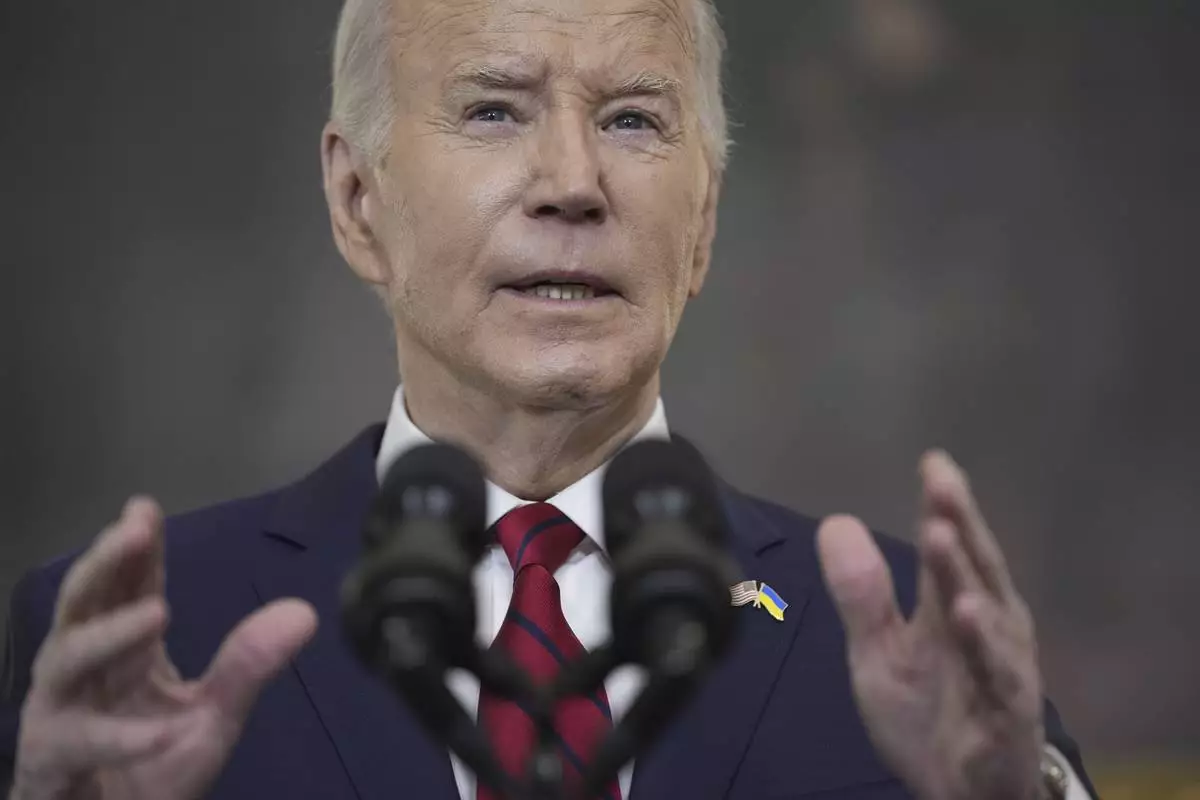
President Joe Biden speaks before signing a $95 billion Ukraine aid package that also includes support for Israel, Taiwan, and other allies, in the State Dining Room of the White House, Wednesday, April 24, 2024, in Washington. (AP Photo/Evan Vucci)
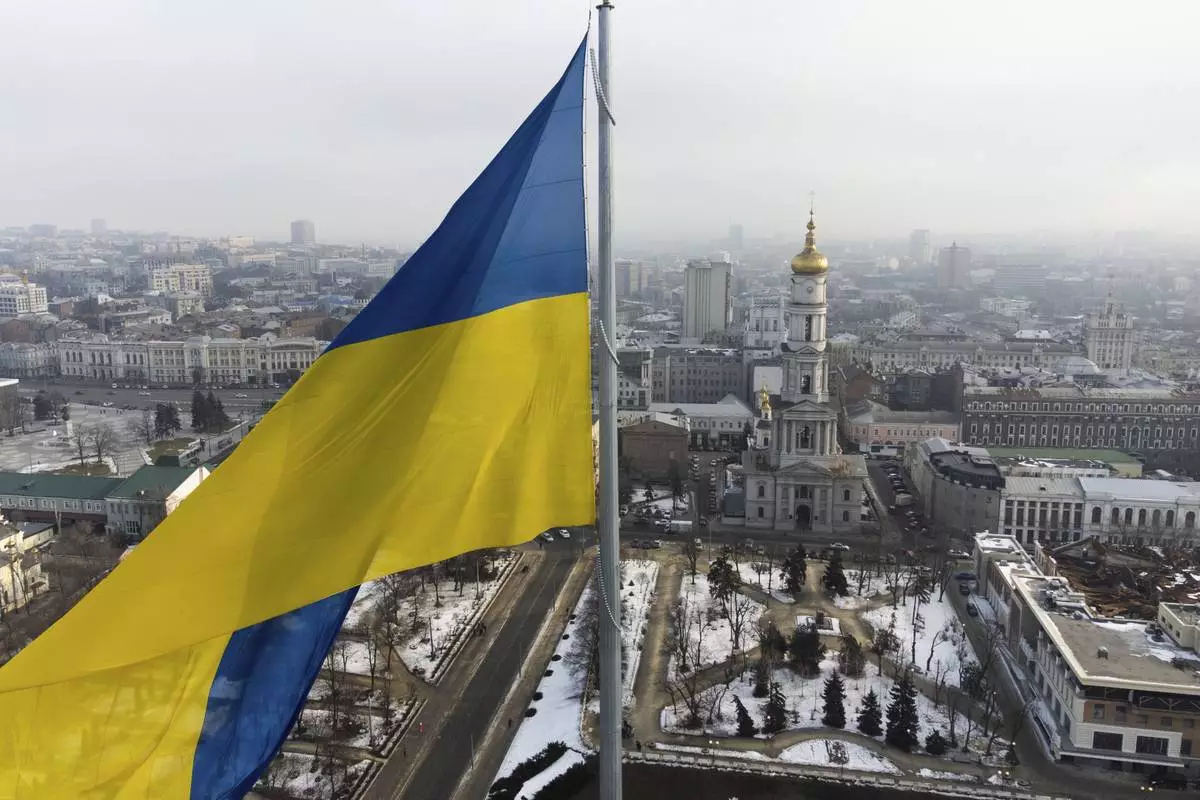
FILE - A Ukrainian national flag waves over the center of Kharkiv, Ukraine's second-largest city, Feb. 16, 2022. U.S. officials say Ukraine for the first time has begun using long-range ballistic missiles, striking a Russian military airfield in Crimea and Russian troops in another occupied area overnight. (AP Photo/Mstyslav Chernov, File)
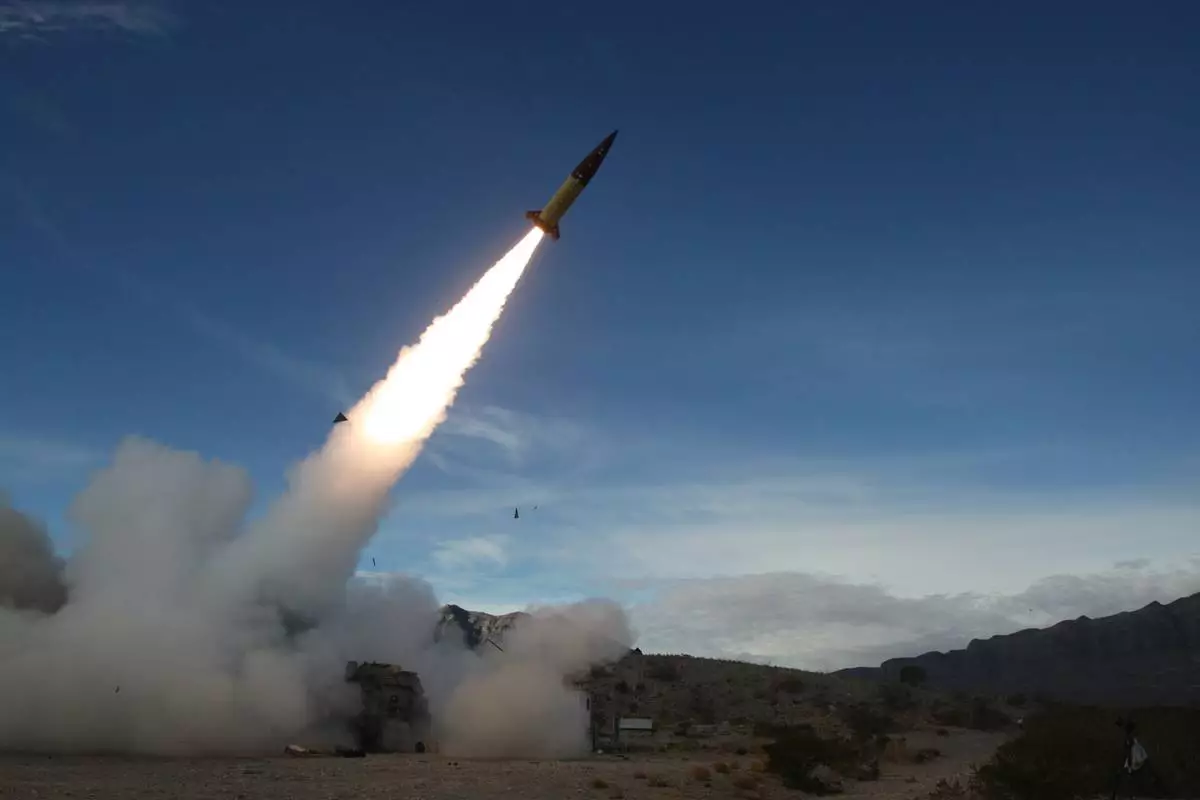
FILE - In this image provided by the U.S. Army, soldiers, from the 3rd Battalion, 321st Field Artillery Regiment of the 18th Field Artillery Brigade out of Fort Bragg N.C., conduct live fire testing at White Sands Missile Range, N.M., on Dec. 14, 2021, of early versions of the Army Tactical Missile System. U.S. officials say Ukraine for the first time has begun using long-range ballistic missiles, striking a Russian military airfield in Crimea and Russian troops in another occupied area overnight. The strikes come about a month after the U.S. secretly provided the weapons so that Ukraine could strike targets up to 190 miles away. (John Hamilton/U.S. Army via AP, file)















